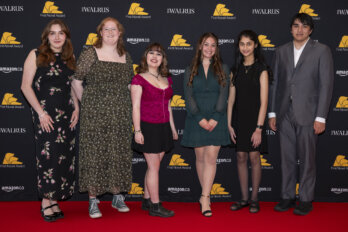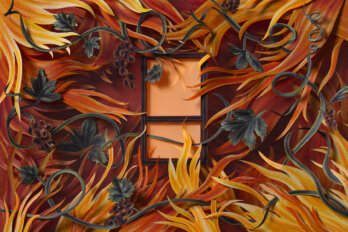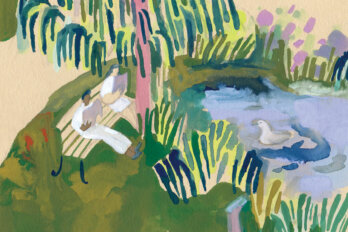It’s cooling on a rack on the kitchen counter. David is on the couch, cleaning under his fingernails with a corner of his Safeway card, and I’m in the kitchen, plucking red petals off a mini-rosebush plant, hoping they’re edible. We’re both getting ready, in our own ways. I’ll say this now: I love Milt and Janey together. Janey is my best friend, and she’s getting married. Milt is different. He’s the kind of man who can wear coloured socks. He knows how to play the mandolin. He buys commemorative stamps at the post office. He sends letters in the mail! David has some misgivings about Milt, but that’s because of his history with Janey. They aren’t in love anymore, obviously, but I know he still has a sweet spot for her.
David hears me clanking dishes in the kitchen. I’m looking for my milk glass cake plate, the one with the edges that look like lace. Bonnie? he asks me. Do you need any help in there?
He’s wearing that old apple green sweater Janey gave him years ago, the J. Crew with the raggedy cuffs. He wears it with his thumbs sticking out through the holes in the wrists. It’s so old it’s just falling apart. But the colour does make his green eyes bright. Like a jaguar’s. And the sweater fits nicely over his broad chest.
Are you going to change? I ask. I find my big white plate under all the other ones. The strawberries still need to be washed. They tumble over one another like drumbeats in the silver colander. When I turn off the taps, I can see that each berry is a small heart.
What’s wrong with this? he asks.
I thought it would be nice to dress up a little, I answer.
Apparently Milt has a black eye. Some guy at the Tudor House Pub in Esquimalt punched him in the face two nights ago, because Milt came in twirling his moustache inappropriately. A table thought Milt was staring at them—flirting?—and this guy stood up and walked over and punched him. But the moustache was a dare; the whole night out was a dare. He teaches English at Raymond Secondary and his Shakespeare class dared him. Milt got a kick out of it. The kids loved him. Growing his moustache for weeks, grooming it. He bought a kit with a tiny comb and a little pot of wax.
We haven’t seen Milt yet, but Janey said his eye looks ugly. And that it was sad, because Milt was just trying to be funny. He’s such an idiot, she said. I love him so much. On the phone her voice sounded squeaky. This was her Milt voice. What do you do for a bruise like that? she asked.
I don’t know, darling, I said. Ice it?
I thought maybe lemon juice, she said. I use it for my dark circles.
I reach for the paring knife and slice the asterisk of green leaves off the top of each strawberry. I lick red juice off my fingers and wipe my hands on my jeans, and then David is standing up behind me.
You make everything so pretty, he says.
But I hear it like, You make such a big fuss about everything.
When I moved into this apartment with David, one of the first things I did, after unpacking the kitchen and loading up my bookshelf, was replace the brass bedroom doorknob with a crystal one I found years ago in a drawer at an estate sale. It’s been my bedroom doorknob for years. I have actually moved this crystal doorknob from three different apartments. The estate sale drawer also held a handkerchief with the letter M embroidered on the corner, and some crumpled-up newspaper from 1962. I had to buy the whole drawer just to get the doorknob. It’s true that I didn’t ask David if he liked it first. He was at work and I had the day off, and I got out the screwdriver and found the doorknob in a cardboard box in our closet. I just put it on without thinking about how he’d react. It was our first fight.
Let’s stay home, he says to me now.
I want to see his eye, I say. Don’t you want to know how he’s doing?
David lifts the hair off my neck and kisses the skin behind my ears. I can smell cigarette smoke and sandalwood soap. He hasn’t been this close to me all day. His fingers play on my waist. I want to turn around and find his mouth. Then he whispers, his warm voice at my ear: Milt is an idiot.
I push David’s hands off my hips and reach for the bowl of whipped cream. I whipped it with my grandma’s old egg beater while the cake was still in the oven. The beater is an old one with a wooden handle. You turn the crank with your hand and the steel beaters spin together. They’re interlocked. They don’t make things like this anymore.
That’s not fair, I say. Besides, Milt is good for Janey.
David is quiet behind me while I push white cream all over the cake with a rubber spatula. I’m not being very careful with it, but the cream is forgiving. It looks fine. Then he jabs his finger into the top of it.
Stop it. What are you doing?
I’m just tasting it, he says.
Did you even wash your hands?
Oh, please.
Why do you have to be so unpleasant? I sweep the spatula over the gouge.
They are just going into this way too fast, David says.
I hold a pinch of red petals above the cake and let go. They drop down in their tiny, random way, polka-dotting the whipped cream.
They’ve been together as long as we have, I say.
The wedding is in six months. I’ve made an angel food cake. I’ve covered it with swirls of hand-whipped cream. I’ve sprinkled rose petals on top and sliced strawberries. Can I make it any more obvious? Janey is my best friend.
They’re both grown-ups, I say.
David and Janey used to share a big studio apartment in Vancouver. They had a spectacular kitchen that they never used. The countertops were made of forest green granite. Chips of mica sparkled in the depths of the stone like a galaxy. This was before Janey quit the film industry, when David was still working at the ski hill. They had posters on their walls, large prints from the films Janey had worked on. They had an old jade plant in a blue ceramic pot. A salad bowl carved from arbutus wood. A disco ball hanging in the window. In the medicine cabinet: David’s fluoride-free toothpaste. His toenail clippers. Janey’s bottle of Xanax. Her tweezers. His Tiger Balm.
We walk to the party along the ocean, on Dallas Road. My mind goes. What’s in our medicine cabinet? David still has his Tiger Balm. But he’s using a new toothpaste now. Other couples are walking, holding hands. I’m carrying this cake, so I can’t hold David’s hand. I wonder: if I was shown a picture of David’s hands, only his hands, would I recognize them?
Crocuses are starting to come up in fistfuls, even though it’s only January. It’s January, can you believe it? I say to David. I’m wearing my tall boots with heels and a new skirt I bought at the Smoking Lily spring sale. It has a bright blue silkscreened jellyfish across the front. We had walked through the neighbourhood to Dallas Road, and reached the point where the hill levels out and you can see the mountains and the ocean all at once. It’s the view that makes people who move here happy they did. In a moment I decide that I will never leave this place. Then David says, What’s to believe about it?
The wind is stronger by the water, and a man is flying kites. One of them is tethered to the ground. The wind pulls hard at the string and the kite spins in pink and yellow nylon circles, thrashing itself about. If it wasn’t tied down, it would corkscrew itself straight up through the air.
I wish I’d thought to wear a hat. My ears are cold and achey. David’s green sweater pokes out from under his jacket sleeves, and he’s worked his thumbs into the stirrups he made out of the holey cuffs. He’s wearing the hat he bought at a snowboarding shop in Whistler.
Is something wrong? I ask him. The brim of his hat is folded up, showing the tag with washing instructions sewn into the seam. It sticks up over his eyebrow, making his whole face look defective.
Do you want me say it out loud, Bonnie?
Say what? I ask. The sun is going down behind us and it turns the clouds into pale yellow vanilla flan. David didn’t even shave tonight. But he can get away with it, because his stubble is downright golden and sparkly in this light.
I just don’t like him, that’s all.
Fine, I say. You don’t have to like him.
We walk quietly together. The Olympic mountain range in front of us is jagged and snow capped. The mountains are so clear they look like a backdrop. David asks if he can carry the cake for me, and I say, No thanks, I’ve got it. He lets me wear his hat because my ears are cold and red. We stop, and he fits it on my head for me. The smell of his scalp is like his sweat: celery salt and wet pine.
Janey met David when she started rock climbing. For a while Janey went super-athletic, wore a lot of brightly coloured and impenetrable clothing made in labs, scientific experiments with bamboo and Lycra. She outfitted her bike with flashing lights and Gore-Tex saddlebags and rode out to this climbing gym about twenty minutes outside of town. David was her climbing instructor. They saw each other every Wednesday afternoon for a month before David made his move. Their first date was at an old hotel downtown. They drank sidecars and manhattans on the rocks. Janey told me that David’s limbs moved like ropes of taffy on the climbing wall. She said that his arms were strong and warm, that they were like precious metal, that when he held her in bed it was like sleeping with a man made out of gold.
Except that the sex wasn’t great. He didn’t really pay attention, she said, if you know what I mean. They lasted what, five months together? Six? Then Milt appeared on a rare warm summer night at a wrap party on the east side. He showed Janey a magic trick: he tucked a cork into the divot at the base of each thumb, looped his fingers together in a smooth twist, and transferred the corks from palm to palm, impossibly. Janey asked him to do it again and again. I met David for the first time at the same party. I have no idea what Janey meant, by the way. David pays attention.
A woman walks a Jack Russell terrier on a black leash with silver studs. The dog strains and strains, pulling with his neck. She drags him away from us, trying to get him to go down to the beach with her. He sees the cake. Up on his hind legs, like a circus performer. He is remarkably balanced on two legs. I raise the cake slightly, in case he jumps for it.
He’s not going to get it, David tells me. Relax.
I am relaxed, I say.
Hi, little guy. David squats down on the sidewalk and holds out his hand. The dog licks it.
Oh, you gotta watch him, he’ll eat anything, the woman says. She stands on the curb in hiking boots and leggings, with the black leash wrapped around one fist. Even seaweed, she adds. I’ve seen him try to eat sand.
He’s very cute, I say, still holding the cake up in the sky.
He’s neurotic, she says. Too much energy.
Hey, dude! calls David. You can jump high, can’t ya? Can’t ya, buddy? He raises his clenched hand up in the air as if he’s offering a biscuit, or a ball. He pretends he’s going to throw it. The dog gets excited. He jumps and jumps at David.
David, I say, stepping back a little. The dog is a ball of dense muscle. He jumps up to David’s waist. Even higher. He reaches David’s bicep. My heels sink into the grass and I try to find a solid chunk of dirt to stand on. One of the rose petals blows off the cake and lands on the toe of my boot. I should have packed it in a box.
His owner pulls the leash away and back, trying to get her dog to calm down, but it doesn’t work. Compressed bits of clawed-up grass and mud make brown pastilles on David’s jeans. The dog growls as he springs forward. It is a dangerous and joyful sound, an accordion full of tiny, sharp teeth.
Uh-oh, it’s time to go, the woman says. I smile at her apologetically as David continues to tease her dog. No, she says, pulling the dog with her. I said no. She drags him to the beach path on a taut line. The dog scrambles sideways and backwards all the way, staring back at David, until he sees something else, probably another dog, down below. He surges away from us.
David and I stand in the grass. I am carrying my cake with two hands.
That was uncool, I say.
I was just playing with him.
You were provoking him.
He’s just a silly rat dog, David says. And he launches himself across the street. A yellow car has to slow down for him. The driver honks twice. Two short blasts, and then she’s gone.
But David turns around, pissed off, and flicks his middle finger at me. He may have been aiming at the driver, who is already around the second bend in the road by now. I tell myself: that was probably aimed at the driver.
Hey, I yell at him. My heels keep sticking in the mud. David springs up and over the curb effortlessly and pounces on the sidewalk, his body loose, like a dancer’s. If he hears me, he doesn’t turn around.
Next month, on Valentine’s Day, David will take me on a walk to the street where some of the first cherry trees are blossoming. We’ll walk from tree to tree with our necks craned, looking up at the blue sky through eyelet flowers. Standing under cherry blossoms makes you beautiful. It’s like candlelight, but instead of a warm glow over your skin the petals light you up from the inside. Under one of these trees, David will propose to me. The conversation will go like this:
David: You always tell me I don’t take this relationship seriously enough.
Me: We don’t have to get into this today.
David: So how’s this for commitment?
And he’ll give me a small box. Polished wood, with a hinge to open it. Inside, a rose-cut diamond in a setting carved with flowers, too ornate for today.
David: I got it on Fort Street. It’s almost a hundred years old.
Me: Is this for real?
I’ll try the ring on, but the tiny gold band will be too small for me. I’ll have to hold my arms up over my head to let all the blood drain out of my fingers so I can force it on. It will turn me into someone from a hundred years ago. When I hold it out in front of me, my hand will look like it belongs to Clara Bow. I’ll want to keep the ring, even later. The dark branches will thrust up and out into the blue sky. The petals smell like corn tortillas. The sun on David’s face, filtered through cherry blossoms, his hair buckwheat honey. He pushes up the sleeve of Janey’s old sweater. It promptly falls back down to his wrist. Pilling under the arms. It’s a certain kind of green, like new stems. What is that colour? Chartreuse. David will smile in my direction, unfocused and self-satisfied, like he’s just climbed one of his five-twelve overhangs.
And despite all of this, I’ll tell him: yes.
I walk past the cars parked all along the ocean side of Dallas Road. People sit in the front seats with their radios on, listening to CBC and watching the freighters sail to Seattle. The lights from the town across the water are just starting to sparkle. Most of the guests will have arrived at Milt and Janey’s house by now. I imagine the scene: Milt wearing an eye patch, tugging at Janey, trying to get her to dance. Janey with her lips pressed into a pink rosette: Stop it, Milt, stop it. Way up ahead, David just turned around. He’s waiting for me to cross the street now, and this cake feels heavy in my hands. The lightest one I could make. It’s mostly air, this cake. It weighs so much I want to drop it.
This appeared in the November 2011 issue.





